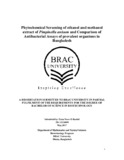| dc.contributor.advisor | Islam, Zubaida Marufee | |
| dc.contributor.author | Rashid, Faiza Noor E | |
| dc.date.accessioned | 2018-02-14T05:36:34Z | |
| dc.date.available | 2018-02-14T05:36:34Z | |
| dc.date.issued | 2017-05 | |
| dc.identifier.other | ID 12136009 | |
| dc.identifier.uri | http://hdl.handle.net/10361/9460 | |
| dc.description | This thesis is submitted in partial fulfillment of the requirements for the degree of Bachelor of Science in Biotechnology, 2017. | en_US |
| dc.description | Cataloged from PDF version of thesis report. | |
| dc.description | Includes bibliographical references (pages 53-55). | |
| dc.description.abstract | There simply aren't enough new drugs in the pharmaceutical pipeline to keep pace with the
evolution of drug-resistant bacteria, the so-called superbugs”.
Medicinal plants synthesize a vast array of secondary metabolites that are important for
human life. For medicinal purpose, antimicrobial activity of substances derived from plant
extracts has been recognized for many years. The antimicrobial activity of the ethanol,
methanol and aqueous extracts of the seeds of Pimpinella anisum L. (Apiaceae) was tested
for their potential antimicrobial activities against Salmonella typhii, Staphylococcus aureus,
Shigella flexineri, Streptococcus pneumonae, Klebsiella sp., Bacillus cereus, Pseudomonas
aeruginosa, Bacillus subtilis, Proteus vulgaris, Enterotoxicogenic E.coli (ETEC), Klebsiella
pneumonae and Streptococcus pyogenes.
Extracts of different days had variable effects on the common pathogenic organisms chosen
in context of Bangladesh. Positive antibacterial effect of aniseed was shownagainstfour types
of bacteria, Shigella flexineri, Bacillus Subtilis, Streptococcus Pneumoniae and ETEC. Day 5
methanol extract showed the greatest activity against Bacillus subtilis and Streptococcus
pneumoniae. Also the Day 5 methanol extract showed maximum activity against Shigella
flexineri, Bacillus subtilis and Enterotoxicogenic E.coli (ETEC) indicating high sensitivity to
the extract. However the ethanol extract had no effect on ETEC.
Phytochemicals such as tannin, saponin, phlobatanin, terpenoid, flavonoid and phenolic
compounds were detected in both ethanol and methanol extracts as the extracts showed
corresponding test result positive. Both the extracts yielded a negative result for the
phytochemicals cardiac glycoside, phlobatannin and steroids. Variation in the solubility of
these phytochemicals in different solvents may have an effect leading to the difference in
antibacterial action. It is expected that the findings of this study will stimulate researchers to
design clinical trials that may lead to the development of less expensive antimicrobial agents. | en_US |
| dc.description.statementofresponsibility | Faiza Noor-E-Rashid | |
| dc.format.extent | 55 pages | |
| dc.language.iso | en | en_US |
| dc.publisher | BRAC University | en_US |
| dc.rights | BRAC University thesis reports are protected by copyright. They may be viewed from this source for any purpose, but reproduction or distribution in any format is prohibited without written permission. | |
| dc.subject | Phytochemical screening | en_US |
| dc.subject | Ethanol | en_US |
| dc.subject | Methanol | en_US |
| dc.subject | Pimpinella anisum | en_US |
| dc.subject | Bangladesh | en_US |
| dc.subject | Antibacterial assays | en_US |
| dc.title | Phytochemical screening of ethanol and methanol extract of pimpinella anisum and comparison of antibacterial assays of prevalent organisms in Bangladesh | en_US |
| dc.type | Thesis | en_US |
| dc.contributor.department | Department of Mathematics and Natural Sciences, BRAC University | |
| dc.description.degree | B. Biotechnology | |

